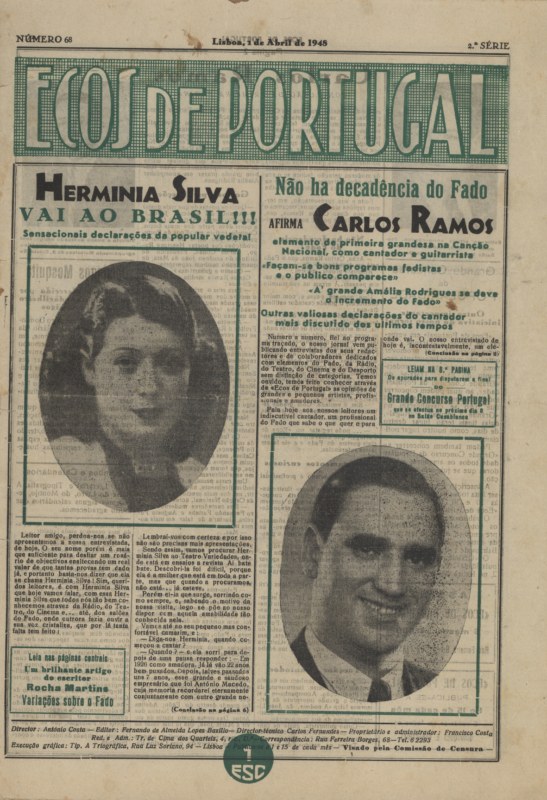Know more:
Carlos Ramos
(N. 10 October, 1907 - M. 9 November, 1969)Carlos Augusto da Silva Ramos was born in Alcântara on October 10, 1907. Music was always part of his life because his father, João da Silva Ramos, was a hunting horn player for King D. Carlos and doorman at Palácio das Necessidades.
Carlos Ramos learnt to play the Portuguese guitar with a group of students during class breaks at Liceu Pedro Nunes. Amaro de Almeida was also a member of this group, and they were colleagues again at Medical School.
His father died when he was 18. He had to give up Medical School and work as clerk at CUF shipyard, and later – due to his professional training in the army - as radio telegrapher at Marconi.
He became acquainted with Fado in Alcântara where he lived. He began his career playing Portuguese guitar for several fado singers, and later also began singing. In an interview to the newspaper "Guitarra de Portugal" on June 30, 1945, he states that in spite of singing for over 15 years he only became a professional in 1944 upon recommendation by Filipe Pinto. And thus he had his professional debut at Café Luso in 1944.
Carlos Ramos started his career as a guitar player for many fado singers in shows, tours and fado houses, as Retiro da Severa or Café Mondego, and in many Portuguese vaudeville theatres (Teatro de Revista).
In his first travel abroad, in 1939 he accompanied Ercília Costa on her United States tour promoted by the Portuguese Ambassador to Washington, João Bianchi.
Upon his return to Lisbon after a tour of Portuguese colonies in Africa in the 1950s, he reveals that it was after this date that he began doing more shows abroad, and he even mentions some of the venues – North America Brazil, Spain, Açores, Madeira, Italy, France, and Egypt. ("Voz de Portugal", November 1, 1956).
His working hours with Marconi wouldn’t allow him to join the regular cast of the fado houses. But he nevertheless appeared in many of those restaurants and, in 1952, joined the regular cast of Tipóia until the opening of his own fado house.
Carlos Ramos performed in several tribute shows, as the one dedicated to Alfredo Marceneiro, in 1948 at Café Luso, and in 1963 at Teatro São Luiz, or the Festa de Consagração de Manuel de Almeida, held at Pavilhão dos Desportos in 1962.
This singer also appeared in various radio broadcasts – both at Emissora Nacional and Rádio Clube Português, and in the first Fado TV shows, that contributed to the increase of success and popularity with a wider public.
In 1956 he had already recorded 16 records and this figure kept on growing. His first were recorded in 78 rpm, followed by various EPs and LPs, initially released by Columbia and later by Valentim de Carvalho.
In an interview to Plateia magazine, on July 1, 1964, Carlos Ramos talked about the conversations he had concerning the possibility to be casted for the film "Fado Corrido" and about the other films he worked in: "Cais Sodré" (1946), "Fado", and "Lavadeiras de Portugal" (1957), saying that although he had been casted to sing, he also would have liked to play a role.
But his dream wouldn’t come true, and "Fado Corrido" was his last participation in the movies. This film was directed in 1964 by Jorge Brum do Canto, upon an original script by David Mourão-Ferreira. It was starred by Amália Rodrigues, and he interpreters songs released that same year by Columbia in the EP "Carlos Ramos canta «Atrás de um Sonho» do Filme Fado Corrido".
In 1959 he opens his own Fado House - A Toca – with the presence of Maria Teresa de Noronha, José António Sabrosa, and Alfredo Marceneiro, and becomes the owner of one of the most famous typical restaurants in Bairro Alto.
Although his regular performances were made at his Fado House, Carlos Ramos still appeared in various shows on stage, radio, and TV. In 1963 he was the godfather - with Celeste Rodrigues - of the Marcha de Alcântara, and in 1966 - with Maria do Espírito Santo - of the Marcha do Bairro Alto.
During the 1940s and 50s Carlos Ramos sang at several fado houses in Lisboa, had a brief international career, performed in plays and films in 1950, and in 1952 joined the cast of Tipóia with Adelina Ramos. He left in 1959 to open his own fado house - A Toca - on Travessa dos Fiéis de Deus in Bairro Alto.
A sudden stroke put an end to his artistic career and he died some years later, on November 9, 1969.
His special voice conquered the public as did some of his greatest hits: "Senhora do Monte", "Anda o Fado Noutras Bocas", "Não Venhas Tarde", "Canto o Fado", songs that linger in our collective memory and were interpreted by various fado singers throughout the generations.
Source:
“Guitarra de Portugal”, December 28, 1939;
“Canção do Sul”, September 16, 1944;
“Guitarra de Portugal”, June 30, 1945;
“Ecos de Portugal”, April 1, 1948;
“Ecos de Portugal”, December 15, 1949;
“Voz de Portugal”, November 1, 1956;
“Plateia”, July 1, 1964;
Booklet of the CD “Sempre que Lisboa Canta”, EMI – Valentim de Carvalho, 1998.
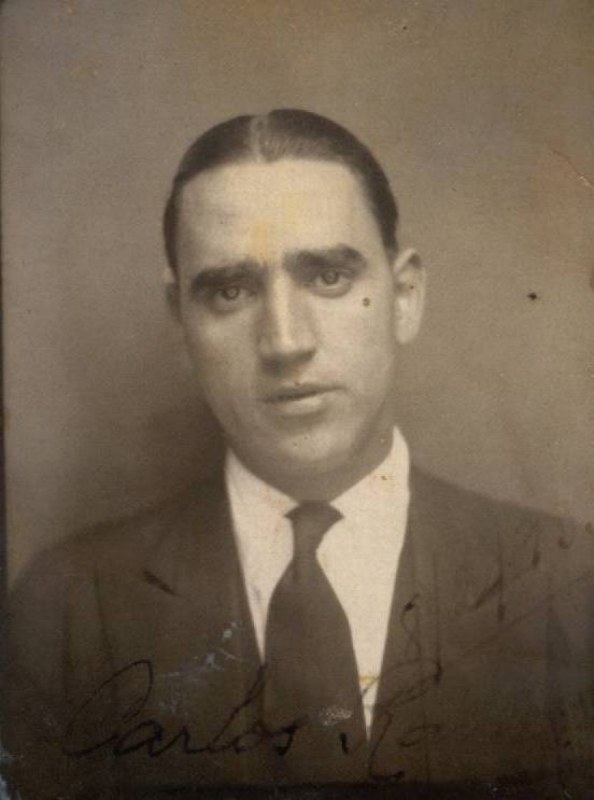
Carlos Ramos, s/d.
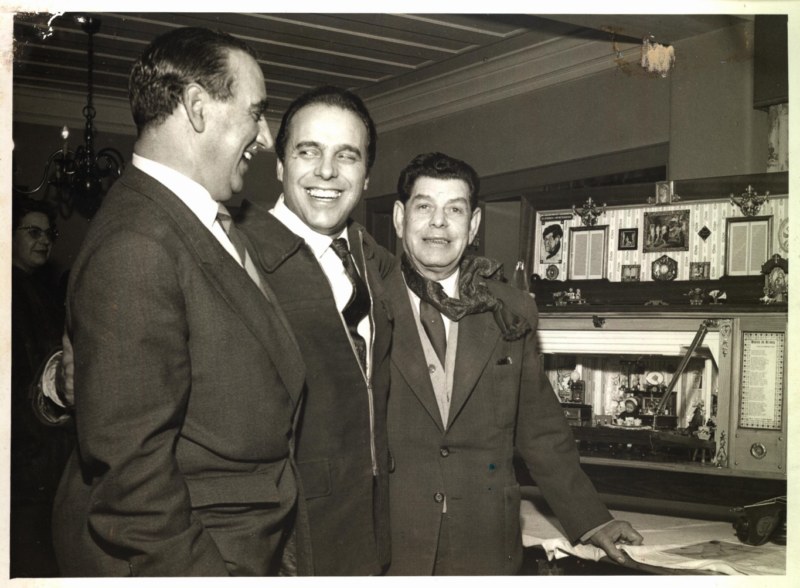
Carlos Ramos, Francisco José e Alfredo Marceneiro, s/d.
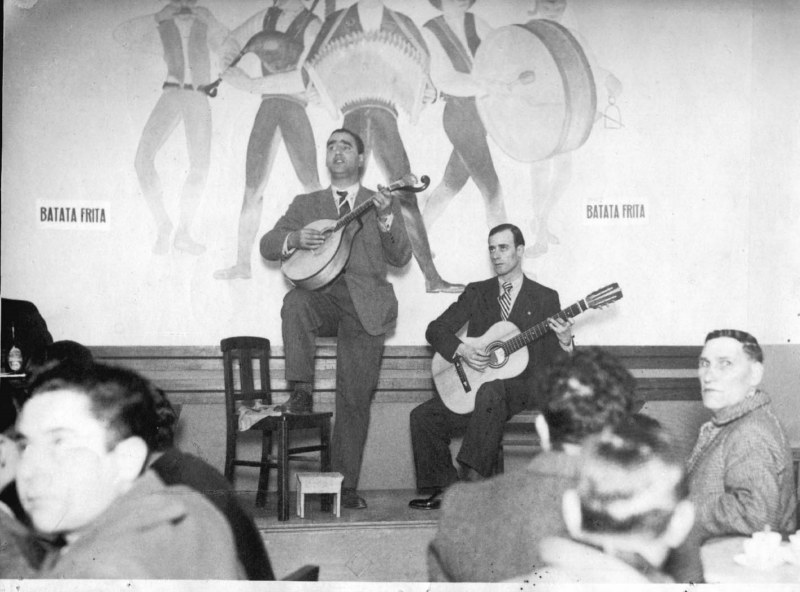
Carlos Ramos e Alfredo Mendes, s/d.
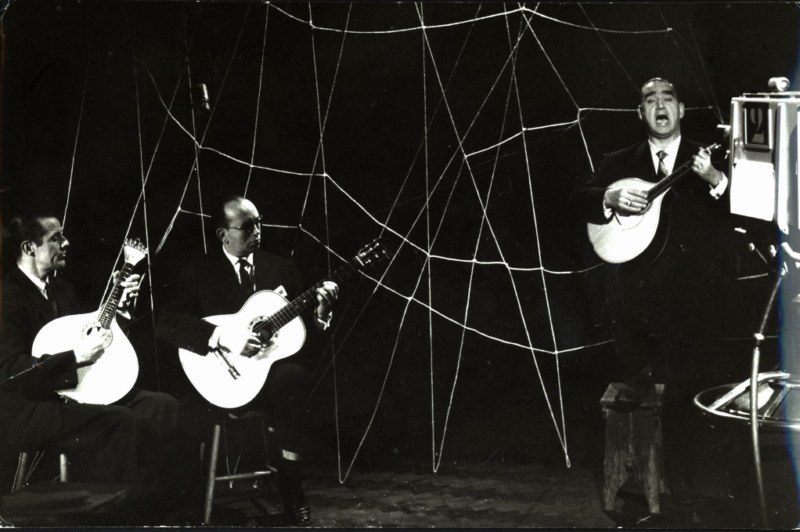
Raul Nery, Castro Mota e Carlos Ramos, RTP, s/d.
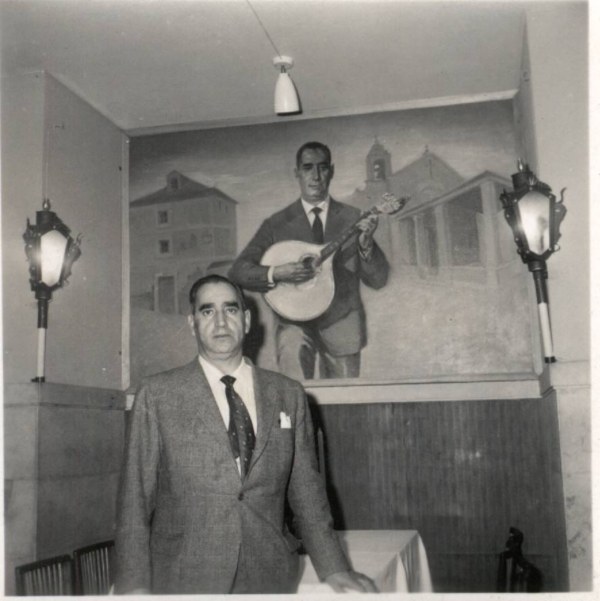
Carlos Ramos, A Toca, s/d.
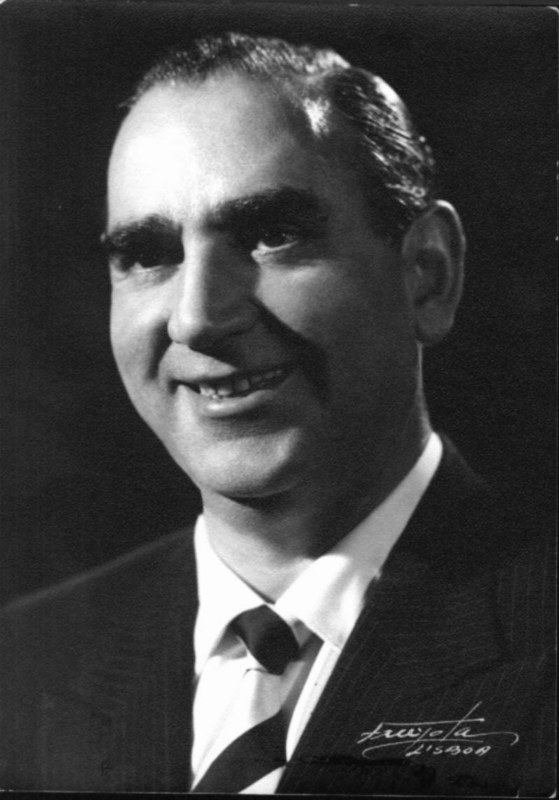
Carlos Ramos, s/d.
-
Silêncio Coração Carlos Ramos (Frederico de Brito / Carlos Rocha)
